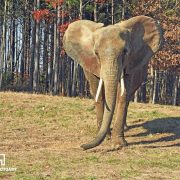New Jersey Becomes First State Ever to Ban Traveling Wild-Animal Acts
With New Jersey Gov. Phil Murphy’s signature, “Nosey’s Law” is officially on the books! Despite a setback for the bill under the former administration, the Garden State is now the first state ever to enact a ban on traveling wild-animal acts.
This monumental victory for animals comes after more than a decade of persistence by PETA activists, who worked resolutely to save the elephant whose story inspired this ban—Nosey.
Thankfully, Nosey was seized at last from her abusers after she was found chained and swaying back and forth in her own waste, suffering from urinary tract and skin infections, intestinal parasites, painful osteoarthritis, dehydration, and malnutrition. She now lives at The Elephant Sanctuary in Tennessee and will never again endure violent blows from sharp bullhooks or be forced to give rides to humans.
Our efforts to save Nosey inspired one of the most progressive bans on wild-animal acts to date.
Nosey’s former handler, Hugo Liebel, caused outrage in 2015 when he took her to the New Jersey State Fair. People were horrified to see this lonely, stressed, and painfully arthritic elephant plodding in circles day after day, and they called for the fair to stop the act. Raymond J. Lesniak, then a state senator, called on the New Jersey Division of Fish & Wildlife to investigate but realized that further measures were needed. So he introduced Nosey’s Law in order to ban traveling elephant acts in the state—and the law has since been expanded to cover other wild and exotic animals as well.
Nosey’s Law overwhelmingly passed the legislature just as the 2017 session closed. But to the dismay of animal advocates everywhere, exiting Gov. Chris Christie “pocket vetoed” the bill.
Nonetheless, in 2018, Sen. Nilsa Cruz-Perez and Assemblymembers Raj Mukherji, Andrew Zwicker, and Jamel Holley cosponsored the bill and gave it new life. Nosey’s Law passed the state’s General Assembly with a vote of 71 to 3 and passed unanimously in the Senate.
PETA thanks the animal advocates in New Jersey for standing against the exploitation, isolation, and physical violence that so many animals still endure in the entertainment industry. New Jersey has become a model for every state to follow!
It’s only a matter of time before abusing animals so that they’ll perform is a thing of the past.
In 2017, both Illinois and New York banned all traveling elephant acts. Ringling Bros. and Barnum & Bailey Circus shut down. Hundreds of venues and dozens of communities across the country now prohibit wild-animal acts. The public has made it clear that it doesn’t want to see feeling, thinking, sensitive animals be bullied into performing uncomfortable and often painful tricks. But we still have work to do.
You can help animals who are beaten, electrocuted, and confined to tiny cages in the circus.
No living being exists simply to be a spectacle or to entertain humans—yet all circuses and traveling shows that use animals treat them as mere props, denying them their freedom and an adequate standard of living.
Using our action form below, please write to venues and urge them to allow any scheduled circus performances to go forward only if they do so without animal acts.



